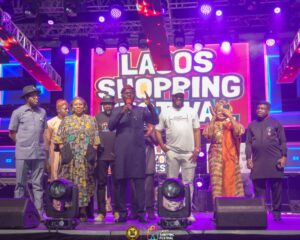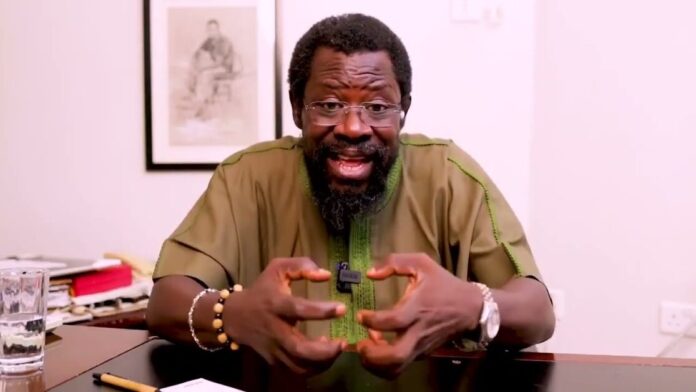Thousands of excited Nigerians attended the opening day of the much-anticipated maiden edition of the Lagos Shopping Festival (LSF) on Monday, December 23 and were served up an electrifying feast of events, activities and promotions across the the main venue of the festival, the iconic Mobolaji Johnson Arena, (formerly Onikan Stadium).
As advertised, first day of the festival lived up to its billing with a colourful blend of commerce, music, innovation and creativity following its flag off by the Executive Governor of Lagos State, Babajide Olusola Sanwo-Olu.
The Lagos Shopping Festival, powered by the Lagos State Government in collaboration with Chain Reactions Africa, a frontline PR firm, and supported by leading brands, including Zenith Bank, Tolaram Group, First Bank Plc, and Guinness, will see millions of people hit the main venue and select Lagos malls to bag the latest bargains, and bring together the best of city’s retail offering, showcasing local and top global brands and shopping experiences, including in-mall promotions.
Speaking at the event, Governor Sanwo-Olu described the LSF as a history-making festival of back-to-back shopping, fun, and entertainment, reaffirming the Lagos state’s commitment to grow small businesses as well as the entertainment industry.
“This is the first of its kind and this event is made to bring shoppers with MSMEs, with innovators, with entertainers, with the creative industry, with the food industry and everybody,” said Sanwo-Olu.
“For the next three days, we are meant to all come together, enjoy good food, good music, sales at discounted market price, shopping at the highest level and just general entertainment with the creativity of Lagos,” the Governor added.
He called on all Lagosians and Nigerian to join the fun, shopping and entertainment.
“Call everybody from Iyana-Ipaja to Alimosho, call people from Agege, call them from Ebute-Meta to Shomolu, call them from Bariga, from Badagry to Ikorodu, from Epe to Ibeju-Lekki, call everyone to come to the arena here at the Mobolaji Johson Center in Onikan where we’ll be doing shopping, we’ll be doing music, we’ll be doing entertainment for the next two days. This is the first of its kind”, Sanwo-Olu added.
He assured all fun-seekers, buyers and sellers of their safety, saying that they are in a safe, secure, peaceful environment, urging them to “to sit back, relax and see another Lagos creativity that is the first, and the very first Lagos Shopping Festival”.
Governor Sanwo-Olu expressed his appreciation to the sponsors of the Lagos Shopping Festival for their unwavering support to drive the story of Lagos commerce, entertainment and creativity.
“I want to thank all of our sponsors from FirstBank, to Zenith Bank, to Tolaram, to Smirnoff Ice, to Indomie Noodles, to OmniBiz, to PowerOil, to Minimie, and to Malta Guinness, all of them, including the Lagos State Government. I want to thank you”.
He also commended all the local and small businesses at the festival, and urged Lagosians and Nigerians to always patronize them.
“More importantly, to all the small businesses that are inside and under the canopies, go out there and make good deals. Go out there and do huge purchases from them. Go out there and make their small-scale market, work for them; because here, we want the market to be meeting all of the shoppers. That’s what this is all about. It’s about buying stuff at the most reduced market. It’s about entertainment, it’s about food, it’s about tourism. This is what Lagos has given to you again,” Sanwo-Olu said.
Also, commenting, the MD/ Chief Strategist, Chain Reactions Africa, the organisers of the Lagos Shopping Festival, Mr Israel Jaiye Opayemi, buttressed the strategic significance of the festival saying, “LSF is poised to be the catalyst that will redefine the true essence of commerce, especially SME businesses, the creative ecosystem, and fun times with family, friends and loved one. LSF is sure set to open a new vista of socio-economic growth from Lagos, to Nigeria, whilst raising a unique bar in the African market”.
Fun-seekers and business men and women alike had entertainment value for their time, with dancing and singing competition with the winners adjudged by the audience receiving cash gifts. The highlight of the day was the energy-revving musical performances from the youthful Ayo Maff, with the soulful rendition of songs from Adekunle Gold the icing on the cake for the audience who kept singing along to his enchanting stage performances.




 BIG STORY4 days ago
BIG STORY4 days ago
 BIG STORY7 hours ago
BIG STORY7 hours ago
 BIG STORY3 days ago
BIG STORY3 days ago
 BIG STORY4 days ago
BIG STORY4 days ago
 BIG STORY4 days ago
BIG STORY4 days ago
 BIG STORY1 day ago
BIG STORY1 day ago
 BIG STORY3 days ago
BIG STORY3 days ago
 BIG STORY4 days ago
BIG STORY4 days ago

























